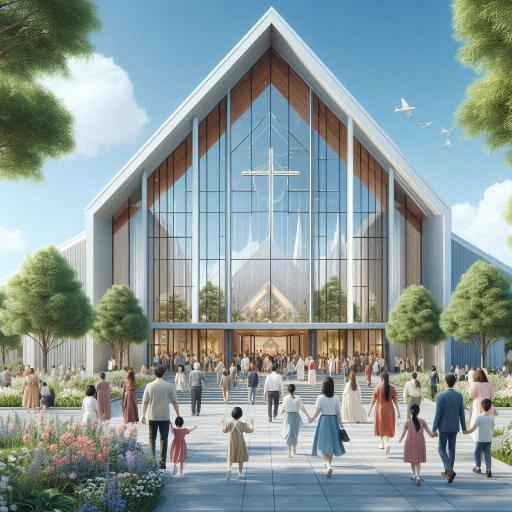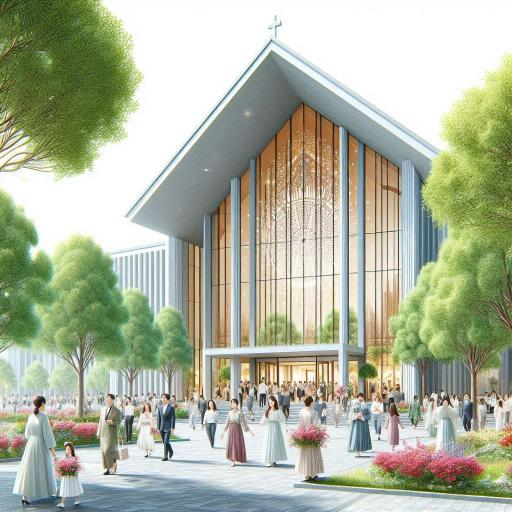Church of the Highlands Exposed
The Church of the Highlands, a leading megachurch based in Birmingham, Alabama, stands as a significant force in the American religious landscape. Founded in 2001 by Pastor Chris Hodges, this non-denominational evangelical church has grown rapidly, establishing a prominent presence both locally and nationally. This article offers an in-depth look into the Church of the Highlands, exploring its history, beliefs, controversies, and future prospects.
History and Background
Founded in 2001 by Pastor Chris Hodges, the Church of the Highlands began as a small gathering in Birmingham, Alabama. Since then, it has expanded to over 20 campuses across Alabama and Georgia, boasting an average weekly attendance of approximately 60,000. The church has evolved from a local initiative into a significant player in the American megachurch movement.
Beliefs and Doctrines
The Church of the Highlands is rooted in Evangelical Christian principles, emphasizing a personal relationship with Jesus Christ, the authority of the Bible, and the power of prayer. Its doctrine centers on the transformative power of faith, the importance of community, and the commitment to living out Christian teachings in everyday life.
Leadership and Governance
Senior Pastor: Chris Hodges
Leadership Structure: The church is led by a Senior Pastor and overseen by a Board of Overseers. The governance model emphasizes both pastoral leadership and accountability through a board of experienced church leaders.

Financial Transparency
While the Church of the Highlands is financially significant, with substantial revenue from donations, fundraising events, and merchandising, it does not publicly disclose its annual revenue. This has been a point of scrutiny and debate among critics and supporters alike. The church’s financial practices are aligned with its mission to support its extensive outreach and operational needs.
Community Involvement
The church is known for its robust community outreach programs, including food drives, educational support, addiction recovery services, and international missions. These initiatives reflect its commitment to social responsibility and community service, impacting both local and global communities.
Controversies and Criticisms
The Church of the Highlands has faced its share of controversies, including:
- Social Media Controversies (2020): Pastor Chris Hodges faced backlash for posts perceived as racially insensitive, leading to public criticism and calls for greater sensitivity and accountability.
- Zoning Disputes: The church has encountered legal challenges related to zoning and property use, reflecting tensions between the church’s expansion goals and local regulations.
- Allegations of Discrimination: There have been various allegations of discrimination, though many of these issues have been resolved or addressed through legal channels.
Media Coverage
The Church of the Highlands has received extensive media coverage, ranging from praise for its community work and growth to criticism over its financial practices and controversies. This coverage has shaped public perception of the church, highlighting both its achievements and challenges.
Educational Programs
Highlands College: A key component of the church’s educational efforts is Highlands College, which offers ministry training and leadership development programs. The college aims to equip future leaders with the skills and knowledge necessary for effective ministry and community service.
Membership and Demographics
With over 40,000 members, the Church of the Highlands has a diverse and growing congregation. Its membership spans various demographics, reflecting the church’s broad appeal and inclusive approach.
Cultural Influence of the Church

The church’s dynamic worship services, rapid growth, and emphasis on community service have made it a significant cultural force. It has influenced the broader megachurch movement and shaped contemporary Christian worship and community engagement practices.
Comparisons with Other Megachurches
Compared to other megachurches, the Church of the Highlands stands out for its rapid growth, extensive campus network, and strong emphasis on community service. Its model of combining dynamic worship with a broad range of outreach programs sets it apart from other large religious organizations.
Future Prospects
The Church of the Highlands is focused on expanding its campus network, increasing community outreach, and enhancing its global missions. Future goals include further international expansion and deepening its impact through additional educational and service initiatives.

Conclusion
The Church of the Highlands exemplifies the power and challenges of modern megachurches. With its significant growth, impactful community programs, and ongoing controversies, it remains a prominent figure in American religious life. Understanding its operations, beliefs, and challenges provides valuable insight into the dynamics of contemporary megachurches and their role in shaping religious and community life.
FAQs
What is the Church of the Highlands?
The Church of the Highlands is a prominent non-denominational megachurch based in Birmingham, Alabama, known for its large membership, extensive campus network, and community outreach programs.
Who is the founder of the Church of the Highlands?
The church was founded in 2001 by Pastor Chris Hodges.
How many campuses does the Church of the Highlands have?
The church has over 20 campuses across Alabama and Georgia.
What are some of the controversies associated with the Church of the Highlands?
Controversies include social media posts by Pastor Chris Hodges, zoning disputes, and allegations of discrimination.
What educational programs does the Church of the Highlands offer?
The church offers educational programs through Highlands College, focusing on ministry training and leadership development.
What are the future goals of the Church of the Highlands?
Future goals include expanding campuses, increasing community outreach, and enhancing global missions.







